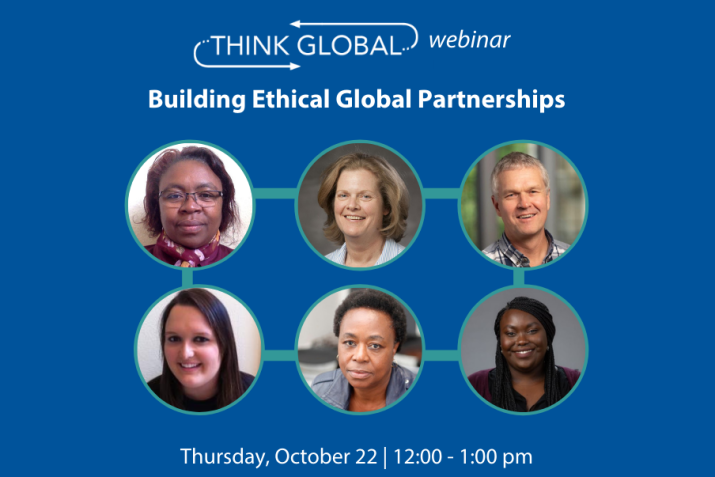“Trust, transparency, humility, respect and solidarity are essential to any partnershps in global health,” says Kearsley Stewart, professor of the practice at Duke.
Stewart recently hosted a Duke Global Health Institute panel discussion on “Building Ethical Global Partnerships.” The virtual talk was part of the institute’s ongoing Think Global series and took place on Thursday, Oct. 22. Speakers included faculty, students and global partners, and experts from Duke’s Kenan Institute for Ethics who discussed how effective global partnerships are formed and nurtured.
Watch the webinar below, or scroll down to read highlights from the conversation.
On respecting the history and culture of the communities you will be working with…
Blandina Mmbaga, pediatrician at Kilimanjaro Christian Medical Center (KCMC), lecturer at the Kilimanjaro Christian Medical University College of the Tumaini University Makumira, and director of the Kilimanjaro Clinical Research Institute.
Doing research in Africa, coming from a western country, it’s quite important to be familiar with the culture and society within the areas they are going to work with…. and have a link person [in the country you’re going to work in] if you’re before beginning.
People come with ideas that are already funded… but they need to involve the community from the beginning [before the ideas are funded].
Laura Mkumba is a native of Dar-Es-Salaam, Tanzania, by way of Atlanta, Georgia. She received her undergrad degree in biology and earned a Masters of Science in Global Health — both from Duke University. She co-founded the Duke Decolonizing Global Health Working Group in and currently works as a clinical research assistant with the HIV Prevention Trials Network and COVID Prevention Network at FHI 360.
Often times in our field of global health or research, we often ignore the historical context of the communities we’re going into.
On conducting ethical research while in a partner country…
Blandina
Make sure… the benefits of research are shared with both the researchers and the society.
Laura
As researchers, do that critical reflection on how did a lot of our global health institutions come to be, how did the field of global health come to be, and how did the way we conduct global health research come to be. And those are very difficult internal reflections to have.
Everything that we do — unfortunately, no matter our best intentions — is rooted in white supremacy and colonialism and racism.
On minimizing the harm to communities you go into as a researcher...
Nokuthula Shabalala is a research officer at the University of Cape Town, Centre for Autism Research in Africa. A licensed clinical psychologist, is currently involved in joint Duke-UCT research aimed at improving access to early interventions for autistic children in Africa.
Adapt and implement a feasible, contextually appropriate intervention… within the existing system of care.
It’s critical you don’t water down an intervention — ensure clinical rigor.
Remain open and reflexive as a team… work through your differences with team members. Issues of race emerge from time to time. Be able to call each other out on things and talk issues through… in ways that don’t do each other further damage.
Jessy Guler, a doctoral candidate at the University of Kansas in the Clinical Child Psychology Program and an alumnus of the Duke Global Health Institute Master of Science Program.
Preparation and training of students in the field is really important… [for student trainees] really focus on listening and giving, instead of talking and training.
For students, do a lot of self-reflection [in advance] and be knowledgeable of your privilege and background.
Laura
Having that really critical personal reflection on the space that you occupy in your home institution… thinking how will the work that I do actually be meaningful [to the community I’m going to work in]. Am I only contributing to a system where we drop in trainees for a few years and then we leave? Or is this actually a partnership.
Do stakeholder engagement before writing the grants, the protocols, the proposals… talk with the communities beforehand [implementing them in a community] and ask, “What exactly do you need?”
A recording of an October 2020 Duke...


